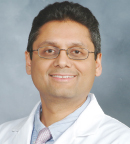ASCO has released a new guideline for the treatment of locally advanced esophageal cancer that will provide a context for the current standards of care, fill gaps in clinicians’ knowledge of therapy options, and help define future treatment.1 An expert panel developed the guideline based on 17 randomized controlled trials that met the inclusion criteria, and, where possible, data were extracted separately for squamous cell carcinoma and adenocarcinoma.

“One of the key things that comes out of this [guideline] is that we really need to think of esophageal adenocarcinoma and squamous cell carcinoma somewhat differently.”— Manish A. Shah, MD
Tweet this quote
“Much like the management of these patients requires a multidisciplinary approach, the guideline panel was specifically developed as a multidisciplinary group that included radiation oncology, surgical oncology, medical oncology, and gastrointestinal oncology, because the approach to these patients involves all of these fields,” said guideline co-chair Manish A. Shah, MD, of Weill Cornell Medicine and NewYork-Presbyterian Hospital.
Changing Epidemiology
Dr. Shah noted significant changes in the disease over the past several decades from a primarily squamous cell histology, which was sensitive to chemotherapy and radiation, to what has become a more pronounced adenocarcinoma histology, particularly in the West, behaving somewhat differently with chemotherapy and radiation. “One of the key things that comes out of this [guideline] is that we really need to think of esophageal adenocarcinoma and squamous cell carcinoma somewhat differently, even though it’s very clear a multimodality approach is needed for all of these patients,” Dr. Shah said.
As a result of the changing epidemiology, phase III trial data that have been used to guide therapy have been mixed. Consequently, the standard approach for locally advanced esophageal cancer may include any of the following treatment paradigms: preoperative chemotherapy with radiation, definitive chemotherapy and radiation without surgery, or perioperative chemotherapy.
The guideline’s second and third recommendations are focused on adenocarcinoma of the esophagus and squamous cell cancer of the esophagus, respectively. “For adenocarcinoma of the esophagus, because the efficacy of chemotherapy or chemotherapy and radiation is modest, we think surgery should be a mainstay. In addition to surgery, preoperative chemotherapy with radiation or perioperative chemotherapy should be offered,” Dr. Shah commented.
Dr. Shah noted there are data suggesting which patients might do better with chemotherapy and radiation without surgery, but this approach should be limited to people for whom surgery is not feasible or safe. There are emerging data, he said, to suggest surgery can potentially be delayed, but this is a subgroup consideration that needs further investigation.
Dr. Shah continued: “What is unique to this guideline is we also provide a caveat—an exemplary case to explain how we think of these patients. We highlighted the extent of surgery and the surgical approach and how that may influence the decision between chemotherapy and radiation versus chemotherapy [alone].”
Lack of Definitive Evidence-Based Data
Guideline co-chair Wayne L. Hofstetter, MD, of The University of Texas MD Anderson Cancer Center, said the lack of definitive evidence-based data is significant, as are the differences between National Cancer Institute guidelines and how patients are being treated on a day-to-day basis. “What this guideline is not saying is the most important,” Dr. Hofstetter said. “The fact that we are not recommending only one method of therapy speaks to the fact that the data still lack definitive enough conclusions for us to say chemotherapy plus radiation is better than chemotherapy alone in all circumstances.

“All we know at this point is that chemotherapy with or without radiation plus surgery is better than chemotherapy alone or surgery alone.”— Wayne L. Hofstetter, MD
Tweet this quote
“All we know at this point is that chemotherapy with or without radiation plus surgery is better than chemotherapy alone or surgery alone,” Dr. Hofstetter added.
Dr. Hofstetter hopes the guideline will help clinicians better understand the nuances of treatment options. “You have to be very clear about your recommendations based on how you’re performing surgery, how you are giving chemotherapy and radiation, or in what situation you would recommend chemotherapy alone,” he said. “Phase I data supporting one method of therapy doesn’t preclude other approaches, and the guideline tries to help with the interpretation of those subtleties.”
DISCLOSURE: For disclosures of all panel members, visit ascopubs.org.
REFERENCE
Originally published in ASCO Daily News. ã American Society of Clinical Oncology. ASCO Daily News, June 24, 2020. All rights reserved.

